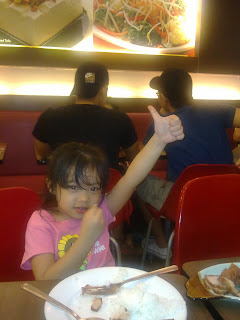During a Parent-teacher orientation in my daughter’s school I was asked to answer a questionnaire as honestly as I could. One question there was on the parenting type I use at home:
1. Authoritarian Parenting
In this style of parenting, children are expected to follow the strict rules established by the parents. These parents have high demands, but are not responsive to their children.
In this style of parenting, children are expected to follow the strict rules established by the parents. These parents have high demands, but are not responsive to their children.
2. Authoritative Parenting
Like authoritarian parents, those with an authoritative parenting style establish rules and guidelines that their children are expected to follow. However, this parenting style is much more democratic. Authoritative parents are responsive to their children andwil ling to listen to questions.
Like authoritarian parents, those with an authoritative parenting style establish rules and guidelines that their children are expected to follow. However, this parenting style is much more democratic. Authoritative parents are responsive to their children and
3. Permissive Parenting
Permissive parents, sometimes referred to as indulgent parents, have very few demands to make of their children. These parents rarely discipline their children because they have relatively low expectations of maturity and self-control. Permissive parents are generally nurturing and communicative with their children, often taking on the status of a friend more than that of a parent.
Permissive parents, sometimes referred to as indulgent parents, have very few demands to make of their children. These parents rarely discipline their children because they have relatively low expectations of maturity and self-control. Permissive parents are generally nurturing and communicative with their children, often taking on the status of a friend more than that of a parent.
4. Uninvolved Parenting
An uninvolved parenting style is characterized by few demands, low responsiveness and little communication. While these parents fulfill the child's basic needs, they are generally detached from their child's life. In extreme cases, these parents may even reject or neglect the needs of their children.
An uninvolved parenting style is characterized by few demands, low responsiveness and little communication. While these parents fulfill the child's basic needs, they are generally detached from their child's life. In extreme cases, these parents may even reject or neglect the needs of their children.
I chose Authoritative because that's how I see myself and the questionnaire said answer honestly.
When it was time for the talk with the teacher, she casually mentioned that I was the first parent who answered authoritative (all others answered permissive). I was worried at first, ‘what does that mean?’ But as I told the teacher, that's how I see myself as a parent.
My kids are both independent thinkers and very decisive and I embrace that with pride. At some point, though, I think that kids who are like them should know their limits, be provided with enough guidance and level of authority or they wil l grow up to be disrespectful, bratty and self-centered. Kids should always be given the chance to express themselves, to discover their surroundings but with guidance from parents or elders.
Honestly, my heart crushes every time my husband brings the kids to time out but at some point I know that this is one way to let kids stop and think why they got into the corner of the house in the first place. Time out provides a moment for them to realize misbehavior like hurting their sibling is not acceptable. But, I will stress, time outs should be used wisely by parents and that after the time out it should be explained to children why this punishment was given to them so they have a clear understanding of the scenario.







































